Kris Spisak's Blog, page 24
August 29, 2017
Trivia: Why is “Mum” the Word?
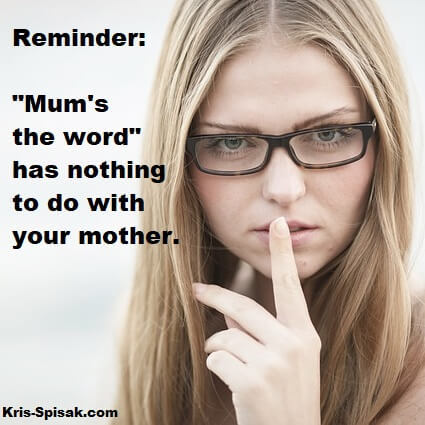

“Mum’s the word” has nothing to do with Philadelphia’s Mummers or your dear old mum (or your dear ever-young mum, of course).
The expression recalls an old usage of the word “mum,” meaning “silent.” It’s a word that’s been used since the fourteenth century. So keeping it “mum,” or telling some “mum’s the word,” is all about silence.
My favorite old usage is when it’s said as an interjection: “mum!”
I wouldn’t recommend shouting, “Mum!” these days, though. All that will most likely happen is a bunch of moms turning their heads. And then they might shush you. Wouldn’t that be ironic?
Join 550+ subscribers and sign-up for my monthly email newsletter for more language trivia like this.
The post Trivia: Why is “Mum” the Word? appeared first on Kris Spisak.
August 26, 2017
Authors on Editing: Interview with Brendan Wolfe
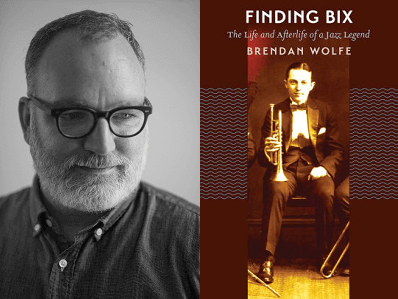
Some writers make me want to sit back and take notes. Whether reading his work or chatting with him in person, Brendan Wolfe is one such writer. Enjoy this detailed interview, writers!

Brendan Wolfe is the managing editor of Encyclopedia Virginia, a project of the Virginia Foundation for the Humanities. An Iowa native and graduate of the University of Iowa, he is the author of Finding Bix: The Life and Afterlife of a Jazz Legend, about the early jazz musician Bix Beiderbecke. His work has appeared in The Morning News, the Colorado Review, and VQR. He lives in Charlottesville, Virginia.
Q & A with Author and Editor Brendan Wolfe
Kris: I’ve found everyone seems to have a different approach to editing. After you finished your first draft of Finding Bix, what did you do next? Okay, after the bourbon … what did your revising process look like?
Brendan: The writing process—at least for Finding Bix—was never so straightforward as 1) write draft; and 2) revise draft. Nor did it follow the way “they” often tell you to do it, which for nonfiction, at least, is more like, 1) start writing and researching book; 2) write detailed proposal explaining every last thing that will appear in your book; 3) sell book; and 4) hurry up and finish writing book, but now with an editor’s input. Or there’s this process, too: 1) start writing and researching book; 2) write detailed proposal; 3) get agent; 4) completely rewrite proposal, maybe multiple times, maybe five hundred times, based on your agent’s endless list of suggestions; 5) sell book for six figures (right?); 6) hurry up and finish writing book, but now with tons of editor input based on the not-unreasonable expectation that this be a friggin’ amazing book because of all the money we’re paying you; and 7) drink lots of bourbon now to calm your nerves.
My process was more chaotic than that, or let’s just say improvisational: 1) start writing and researching book having exactly zero idea what I’m doing; 2) talk to editor, who reminds me the book should have a beginning, middle, and end; 3) write first-ever proposal for a high-powered agent who is interested in the project until she reads my proposal; 4) continue to write book, still not knowing what it is, but writing proposals as I go, which helps to clarify it for me; 5) miraculously sell the still-unfinished book to small imprint of large company; 6) finish the book only to have the imprint shut down in the meantime and cancel my contract; 7) send the manuscript to that original editor—beginning, middle, and end, she said—who smartly suggests what amount to substantial revisions; and, finally, 8) quit out of sheer exhaustion and disgust with everything.
Then I had another bourbon.
And I worked on a million other things for years. After which, I eventually revisited those revision suggestions and begin to rework the book. It took me a long time to stop hating the thing and gain perspective on how best to tell the story. And I’m not joking about the beginning, middle, and end. From the very start, even in the idea stage, the arc wasn’t there, by which I mean the main conflict that should fuel the whole book. Or it was there, but it wasn’t being presented as the conflict. In order to make it work, I had to fiddle with the form, and I figured that out with the help of an editor friend of mine. Talking with her made all the difference. She didn’t figure it out for me, but she helped get me to where I could start writing again and figure it out for myself.
In the end, the revision was mostly a process of cutting cutting cutting, reordering, and filling in a few gaps with new writing.
Kris: And in the end, you did it. The book sold and was released by University of Iowa Press in 2017. How’s that for an ending of that story?
How did lessons learned from your MFA help the writing and revision process of a full book?
Brendan: So what? If I could boil my years in Iowa City down to a single, two-word lesson, that might be it. Why do I care about that time you did that thing and the light was just perfect and it was all so achingly poignant? Or why do I care about your travels overseas or your dysfunctional family or your drinking or the rare disease you may or may not have overcome? I mean, I don’t care. Not as a rule. No reader does. And while that’s easy enough to nod your head to, it’s still a really difficult lesson to learn. But that’s my life! you insist. That really happened! So what. “Bix Beiderbecke was the first great legend of jazz.” Yawn. Nobody cares.
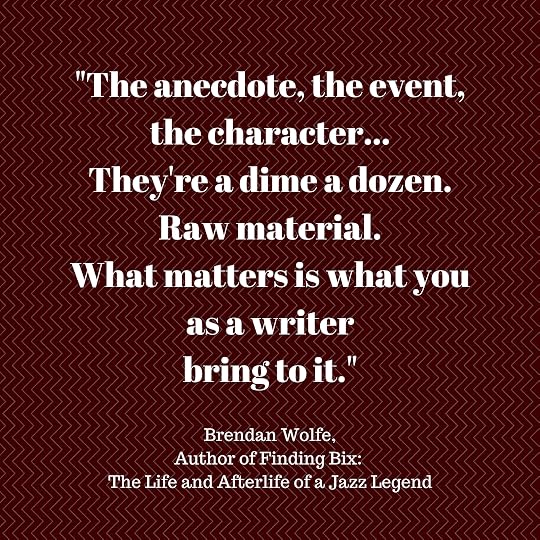 The rare exceptions exist, of course. “Beyoncé …” Let me stop you right there. That’s enough. We all care. Obviously. Same with “farm to table” and Jane Austen. But that’s about it, honestly. So it’s our job not only to recognize, first, that nobody cares—except ourselves, the writers, of course, which is crucial—but also to then assume the responsibility for making readers care. One does this through penetrating insight, kickass prose, mind-bending tricks of form. Whatever. You twist your readers’ arms into caring or you whisper to them, seduce them, sing to them. But however you do it, that’s the whole point of writing. The anecdote, the event, the character—they still don’t matter. They’re a dime a dozen. Raw material. What matters is what you as a writer bring to it.
The rare exceptions exist, of course. “Beyoncé …” Let me stop you right there. That’s enough. We all care. Obviously. Same with “farm to table” and Jane Austen. But that’s about it, honestly. So it’s our job not only to recognize, first, that nobody cares—except ourselves, the writers, of course, which is crucial—but also to then assume the responsibility for making readers care. One does this through penetrating insight, kickass prose, mind-bending tricks of form. Whatever. You twist your readers’ arms into caring or you whisper to them, seduce them, sing to them. But however you do it, that’s the whole point of writing. The anecdote, the event, the character—they still don’t matter. They’re a dime a dozen. Raw material. What matters is what you as a writer bring to it.
I read so many personal essays in Iowa City that demonstrated real contempt for this basic question of who cares—either out of ignorance or hubris. So it has really stuck with me. And I thought about it a lot while writing Finding Bix. Nobody much knows about Bix Beiderbecke, and those who do are not a large enough audience to convince publishers to take a risk on my writing. So I had to tell a story that, ideally, would convince someone who has no idea who Bix was or who doesn’t listen to jazz, to care for at least a couple hundred pages. I accomplished this by framing the book as a series of questions, which is often effective because people hear a question and they immediately want an answer. They’re willing to jump through all kinds of ridiculous hoops if they think there’s going to be an answer to something that five minutes earlier didn’t matter to them in the least. And I rooted the whole thing in personal experience, not because my experience was unique but because it wasn’t. Because it provided a way for people—I think—to insert themselves, to see themselves.
Kris: How about lessons learned from your journalism background?
Brendan: Write prose that is clear. That says what it means. That can be read and enjoyed by a broad swath of intelligent human beings. The other big lesson I learned from journalism is that when you’re telling someone else’s story that’s a big responsibility.
It’s not just that you should get it right (you should) but that what’s right to you may not be right according to your subject. I experienced this most explicitly while covering Indians in Maine. The whole idea of someone outside their culture coming in and asking them questions and writing down the answers was, to at least some of them, abhorrent. “These are our stories,” they told me. I had to say, “Well, this is how we do journalism. I talk to you and then go back to the office and write it up as I see fit.” It was a divide I didn’t know how to cross. But it made me acutely aware of the fact that my understanding of your story and what you’re saying will not always be the same as yours. And while that’s fine, you also need to be aware of that, and respectful. You need to never forget it. (Ask Janet Malcolm about that sometime.)
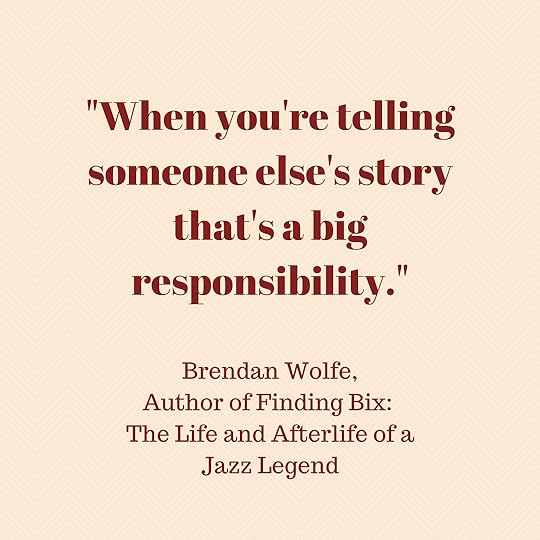 In Finding Bix, I interviewed and wrote about a whole subculture of scholars, critics, biographers, musicians, record collectors, and fanatics. We have a certain amount of common ground, but mostly we’re different. I was/am the outsider. I disagree with them on a lot of stuff and find their subculture to be a little uncomfortable, frankly. A little odd. I struggled with how to be both honest and respectful, how to be empathetic while still being able to poke fun. To pop the self-seriousness of it all. If they were going to be mad at me—and holy mackerel, they were!—I at least wanted to be sure I had done my best to be fair.
In Finding Bix, I interviewed and wrote about a whole subculture of scholars, critics, biographers, musicians, record collectors, and fanatics. We have a certain amount of common ground, but mostly we’re different. I was/am the outsider. I disagree with them on a lot of stuff and find their subculture to be a little uncomfortable, frankly. A little odd. I struggled with how to be both honest and respectful, how to be empathetic while still being able to poke fun. To pop the self-seriousness of it all. If they were going to be mad at me—and holy mackerel, they were!—I at least wanted to be sure I had done my best to be fair.
Kris: Your writing has stirred up a lot of heated feelings today for some audiences. How did you approach your edits in regards to thinking about your reading audience?
Brendan: Ciaran Carson once told an interviewer that he doesn’t give a fig about entertaining his readers. “If there is an audience, it’s my wife,” he said. “It’s enough for me.”
Not for me! And not just because I’m not married. If it means anything to tell someone to worry over who cares, then you can’t discount the importance of an audience, let alone a disinterested audience—i.e., excluding all husbands, wives, sister-wives, sisters, brothers, doting parents, surly children, friends, coworkers, or cousins currying favor.
Writing needs to operate successfully on the level of words on the page, not as a proxy for people who already know you, who can fill in all the charming ways you’d tell the story were you there in person, sipping a bourbon.
So you have to think about your audience. You have to figure out who this audience is. Otherwise it’s journaling, which is different. And I figured out at some point in the process that my audience did not include members of the aforementioned subculture of scholars, critics, biographers, musicians, record collectors, and fanatics who see Bix Beiderbecke as the alpha and the omega. To them, my book would offer nothing much that was new and much that was objectionable. That helped give me courage to write honestly about them, but I still knew they would read it or at least frantically search the Amazon “Look Inside” feature for their names. So I checked and double- and triple-checked myself for tone, accuracy, and fairness when it came to how I wrote about everyone I named in the book. They might be mad, but it behooved me to remember that it was much more difficult and even painful to be written about than to be the one writing. The writer has all the power and needs to take that seriously. You’re taking people’s stories and making them your own. That’s your right, that’s literally what you do, but it’s no small thing.
I did have one dude threaten to sue the press and me personally should I so much as even mention his name in the book, so that helped clarify the stakes a bit. In the end, I mentioned his name and quoted him, and I did so chuckling an evil chuckle. So far no lawsuit.
Kris: That’s fascinating. And to round out your personal writing background. How have your experiences as editor of Encyclopedia Virginia made you re-examine your own writing process?
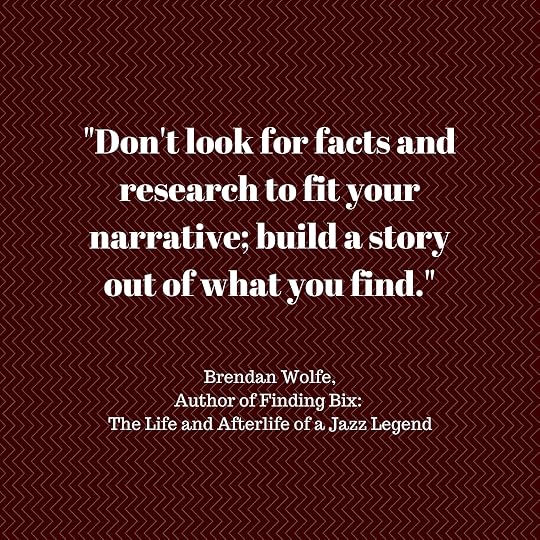 Brendan: Get your facts straight and be straight with the reader. The first comes mostly out of my experience with the encyclopedia. It’s really easy to be lazy, too quick, to assume something’s true or simple or straightforward when it isn’t. So do the legwork and get it right. It matters. Don’t look for facts and research to fit your narrative; build a story out of what you find. That matters, too. And if possible, tell the reader how you got your facts, where they came from. Point them to your sources and let them investigate for themselves. Be transparent.
Brendan: Get your facts straight and be straight with the reader. The first comes mostly out of my experience with the encyclopedia. It’s really easy to be lazy, too quick, to assume something’s true or simple or straightforward when it isn’t. So do the legwork and get it right. It matters. Don’t look for facts and research to fit your narrative; build a story out of what you find. That matters, too. And if possible, tell the reader how you got your facts, where they came from. Point them to your sources and let them investigate for themselves. Be transparent.
Being straight with the reader involves a slightly different process. I mostly write nonfiction, but whatever you write, from page 1 you enter into a kind of contract with the reader—in which that doofus who doesn’t know what he’s doing (and is that bourbon he’s drinking?), hereinafter called “The Writer,” agrees that the following ________________ (essay / encyclopedia entry / recipe / biography / note of abject apology) is Nonfiction, i.e., the truth to the best of said Writer’s ability; and that the person who’s only half paying attention while also texting and binging Season 12 of NCIS, hereinafter called “The Reader,” agrees to hold The Writer to the standard heretofore articulated and no other standards, including but not limited to “poetic license,” et cetera.
It sounds dumb, I realize, but it’s important in the context of some of the liberties my old Iowa classmate John D’Agata has taken with his writing. If you say something happened on the fourth floor of a building, then it better have happened on that floor and not on some other floor because it sounds better. Not unless you’ve communicated with the reader, in one of a hundred ways, that this is the kind of piece that will fudge those facts. Shamrock Tea , a truly gorgeous book by Ciaran Carson, whom I mentioned above, reads like creative nonfiction until that crucial moment when the main character, whose name is Carson, literally steps into a painting and back in time. At that point the author is telling us something important about how to read everything that came before and will come next.
I once submitted a personal essay to a publication, and the editor asked me if I had notes and/or recordings to substantiate the dialogue in various scenes that were set anywhere from weeks to years earlier. When I told the editor I could produce no such substantiation, he decided to italicize the dialogue as a signal to readers that it was invented. That was fine with me—I was just happy he liked the essay!—but it got me to thinking about that contract.
Does the average reader really believe that the dialogue in a memoir is exact, or does she assume it’s a reconstruction from memory? What happens when you construct details and dialogue from when you were a baby and have no such independent memory? (Another classmate of mine at Iowa did that.) Or what about in a biography? A biography Bix Beiderbecke, published in 1974, employs dialogue that represents the authors’ idea of how scenes played out based on descriptions from people who had been there. Does the contract address that? I have my own opinions, but the point is this: when students have asked me how “true” things need to be, I refer them to the contract. And if they don’t like what the contract says, then of course they can and should change it. Just make sure you let your readers know!
Kris: Do you have any sentence constructions, words, or phrases that you know you overuse that you pay attention to in the editing stage?
Brendan: Actually my writing is perfect.
Kris: Lovely. I appreciate the confidence. Writers absolutely need that too. Let me ask this in another way: do you have any pet peeves—words overused or wordiness due to a common phrasing?
Brendan: What really drives me nuts are cheap tricks such as when you directly state something only to immediately and coyly undercut it, or when you slyly transition into the second person for no real reason, or when you write a short sentence and then follow it up with something much longer, especially something that ends with a series of parallel phrases, parallel in the sense of similar usage. And construction, too, I suppose. But that’s optional.
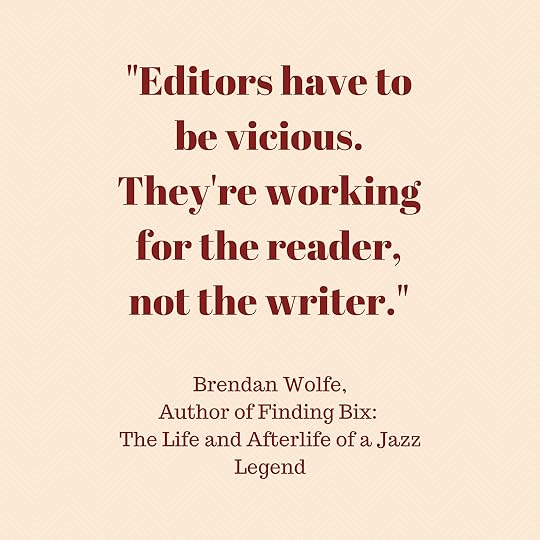 Seriously, I tend to be too cute by half and to overwrite. Cut cut cut. And my pet peeve is dead language. Ask Donald Hall about dead metaphors. That’s how I feel, too. And sometimes, when I’m really looking to impress, I’ll write something that sounds good but … just … doesn’t make sense. Sometimes editors are too nice to question those moments because we give the writer too much credit. Editors have to be vicious. They’re working for the reader, not the writer.
Seriously, I tend to be too cute by half and to overwrite. Cut cut cut. And my pet peeve is dead language. Ask Donald Hall about dead metaphors. That’s how I feel, too. And sometimes, when I’m really looking to impress, I’ll write something that sounds good but … just … doesn’t make sense. Sometimes editors are too nice to question those moments because we give the writer too much credit. Editors have to be vicious. They’re working for the reader, not the writer.
Kris: As an editor, you might have just made my heart flutter a little–my cold, hard editor’s heart. Just kidding. I love my writers, but your point is absolutely true. It can be hard to receive editing notes that question your work, but these questions are only there to make the total stronger.
Now, after you began working with the manuscript with your editor, what kind of additional changes did you make?
Brendan: Funny story. My manuscript was sent out to some folks who vetted it, per university press SOP, and along with those comments, my editor provided her own feedback. It was often quite critical where the vetters had been almost fawning (well, not fawning, but let’s pretend), and that was a surprise but it was also encouraging. Here’s an editor who, while she likes the book, has real ideas of how to make it better. The only problem was that those ideas were kind of vague and it was difficult to know how to turn them into revisions (e.g., the first fifty pages are kind of slow). I told the editor: you give me more specific feedback, and I’ll commit to working with you to revise as you think best. What happened, though, was that she abruptly left the press, and her replacement told me they would accept the book as-is. No revision necessary.
So that was nice to hear, but it was also a lost opportunity to make the book better. You see, my writing isn’t actually perfect.
There were a few revisions anyway, of course. The previously mentioned threat of a lawsuit required, just to be safe, a rewrite of part of the book’s final section. A friend of mine thinks it made the ending better. I’m not so sure, and that’s what can be frustrating about such revisions. One way, another way. Some totally different third way. Who’s to say what’s better? I lose track of my true north pretty quickly. (Is that a dead metaphor or just a cliché?) I also had included a handful of footnotes in the manuscript that behaved as real-time, sometimes critical annotations on the text. No way, said the press, and in a couple of places it was challenging to figure out how to work around them. In one instance, the result was clunky and unfortunate. I’d like to have a do-over there.
Kris: What does your editing process look like in regards to double-checking your research?
Brendan: I created endnotes for the book for the reasons I mentioned above: tell readers where your facts came from and how to track them down. If you found a primary source referenced in a secondary source, cite the secondary source and the primary source, which means go find the primary source and look at it for yourself.
Anyway, I didn’t start working on the endnotes until I had written most of the book, which meant I had to go back and track down every last statistic, quotation, date. It was maddening, but it forced me to double-check, which is to say fact check, and I found a decent number of errors as a result. I made a couple of small mistakes in the book, but I noticed that those almost all were the result of material I had added at the last minute. I hadn’t double-checked it in the same way, and that was a problem!
The press could have decided not to include endnotes for whatever reason, but I would recommend creating them anyway—for your own peace of mind and for the sake of your credibility with your editors.
Kris: What do you wish you know about revision a long time ago?
 Brendan: You can’t revise if you don’t first write. And that first draft ain’t gonna be art. So just belch it out if you have to, then do the work of making it art. Or whatever it is you’re trying to make it. Also, take your time.
Brendan: You can’t revise if you don’t first write. And that first draft ain’t gonna be art. So just belch it out if you have to, then do the work of making it art. Or whatever it is you’re trying to make it. Also, take your time.
I’m thinking of Donald Hall again. In his estimation, too many poets are writing too damn many poems. “Piss on that,” as he might say.
“I see no reason to spend your life writing poems,” he argues in Breakfast Served Anytime All Day , “unless your goal is to write great poems.”
He recalls Horace’s advice that young poets keep their poems to themselves for ten years. Do this not out of modesty, Hall says, but out of respect for revision. (“Revision moves me from the raw, formless suffering of the poem’s impetus to the expressed suffering of the poem.” In other words, the pain resides in the first draft, the poem in the revision.) Pope cut those ten years down to five. “By this time, I would be grateful—and published poetry would be better—if people kept their poems home for eighteen months,” Hall sighs. “Poems have become as instant as coffee or onion soup mix.”
While not a poem, Finding Bix took me thirteen years. I really hope Hall would approve.
I like this concept: “the pain resides in the first draft, the poem in the revision.” Sometimes this writing thing takes a really, really long time. I’ll admit, that the editor side of me wants to strike some of the adverbs in that last sentence, but it might not be honest to the length of the process if I did. There is so much wisdom in what Brendan shared in this interview, but I like that idea of closing with the time a single a piece can take. To truly do what needs to be done, sometimes it takes a lot of time, and that is okay.
The writing process thankfully doesn’t always measure in years or decades, but to do it well, it is far from quick. It is far from easy. But I have faith that if a writer keeps pushing, their writing will get there.
Thank you so much for sharing your thoughts on your craft, Brendan Wolfe, and happy writing, folks!
Join 550+ subscribers and sign-up for my monthly email newsletter for more interviews like this.
The post Authors on Editing: Interview with Brendan Wolfe appeared first on Kris Spisak.
August 24, 2017
Writing Tip 231: “Staff is” vs. “Staff are”


No, not that kind of staff. Beings who carry these kinds of staffs laugh at people’s bafflement over verb choice.
Uh, oh. Did I just make you question how you wrote that last email? Or did you just talk yourself into a difference concerning magical staffs versus the staff of your office? It’s not that simple, folks.
Here’s an example of a subject-verb pairing you might write fairly frequently if you’re in the business world, and I’m sorry to say that the “staff is” vs. “staff are” choice isn’t a matter of wizardry vs. human resources—though, maybe if you really get into a conversation about jobs at the Ministry of Magic, it might get a tad more complicated.
You are correct that if you’re talking about wizardry and warlocks, the correct usage would be “the staff is.” That’s the easy one. A staff, or a pole or rod that denotes authority and/or gives support, is a singular object.
However, the more complicated part of this conversation pertains to your office staff. Okay, maybe your office staff can be complicated on multiple levels, but focusing in on your verb choice, you have to pay attention. The answer changes depending on your use.
“Staff” is a collective noun—others include “group,” “band,” “herd,” “array,” “board,” “panel,” and “crowd.” Before you run away from the jargon, all “collective noun” means is that all of the parts within the collective sometimes act together and sometimes act individually.
The trick to knowing the correct verb is knowing whether you’re talking about the whole or the different parts within it.
For example:
The staff is all present for the workshop. (They are a group, and their actions are being discussed as one.)
The staff are assembling parts of the presentation. (The staff members are undertaking different tasks in this example, while still working together as a whole.)
The staff is volunteering at a local soup kitchen. (Again, they are all doing the same thing. And kudos for their community involvement!)
The staff are handling the food line, handing out utensils and plates, serving the visitors, and offering napkins. (The staff members each have their own tasks here again.)
Staff can work as a singular noun or a plural noun depending on its usage. Your job is simply to adjust accordingly. Easy right?
Now if the staff has a magical staff, or if they each have their own staffs, things might start to get complicated, but we’ll leave that grammatical equation to the fantasy-writing professionals.
Business communications are all about getting it right. It’s time to pay attention.
Join 550+ subscribers and sign-up for my writing and editing email newsletter for more tips like this.
The post Writing Tip 231: “Staff is” vs. “Staff are” appeared first on Kris Spisak.
August 17, 2017
Writing Tip 230: “Under Wraps” vs. “Under Raps”


Look at this adorable puppy. Should he be kept under wraps or under raps?
Under the lyrics of your favorite song, you might hear the base line driving the music. Depending on your musical taste, maybe its “under raps,” but this is the only time you should use this spelling.
When you think of the correct spelling of this idiom, which is “under wraps” by the way, think instead of Egyptian mummies or birthday presents. Think of an adorable puppy in hiding that your landlord doesn’t want you to have.
This expression dates back to roughly 1939, but it’s closely connected with the 15th century origin of the word “wrap.” In its earliest uses, “to wrap” referred to the process of tightly packing up bread, surrounding it with material to keep it fresh and clean. Starting in the mid-1900s, “under wraps” came into use, when referring to tightly covering up an idea.
Just to wrap things up—see what I did there with another “wrap” expression, this one with an origin in the film industry?—there’s no need to keep this writing tip under wraps. Honestly, if you wanted to give it a soundtrack with some intense beats under raps, I’d be okay with that too.
Just know the difference please.
Join 550+ subscribers and sign-up for my writing and editing email newsletter for more tips like this.
The post Writing Tip 230: “Under Wraps” vs. “Under Raps” appeared first on Kris Spisak.
August 11, 2017
Authors on Editing: Interview with Louise Ricks
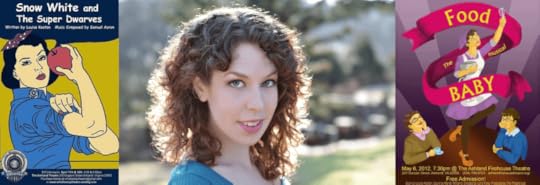
To be a good writer, you have to get into your characters’ heads to know what makes them tick, to know what they want and why, to know their fears, secrets, and how they take their coffee. We storytellers know this.
We all find our own ways to bring people to life, but actress and playwright Louise Ricks has an entirely different experience of thinking about her characters. For Louise, she not only knows them. Sometimes, she has the opportunity to step into their skin.

Louise Ricks is an award-winning playwright, actress, and author whose work has been the delight of audiences around the country. Her more notable works include Snow White and the Super Dwarves, CATTYWAMPUSED: Tall and True Tales of American Folklore, and Cinderella: The Fairy Godmother’s Tale, which made its New York debut at the New York Children’s Theatre Festival. In her personal mission to create quality family entertainment, Louise founded the Whistle Stop Theatre Company in Ashland, Virginia, where she writes and produces every show.
Q & A with Actress and Playwright Louise Ricks
Kris: What does the word “editing” mean to you?
Louise: Necessary. I’m a big proponent of less is more. My goal is to eliminate the clutter so the essence of my story can speak for itself.
Kris: Tell me about your editing process. Do you edit as you write your plays, only after you finish, or a little bit of both?
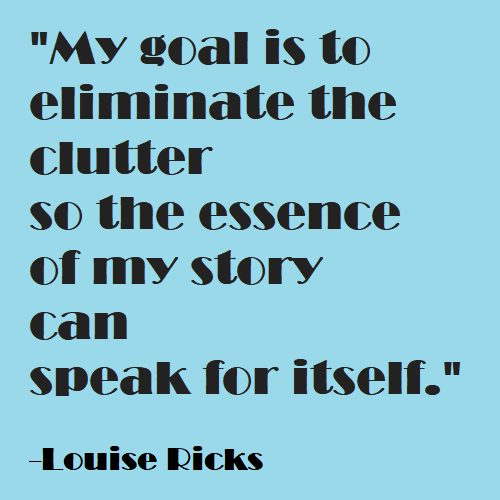 Louise: I wish I could say I can write my story completely and then go back and edit, as this is always my goal. Editing while I write tends to slow me down and stop the flow of creativity. None the less, whenever I take a break, I come back to my work, read what I’ve done so far, and edit along the way. It helps me get back into the flow of the story and makes me question what I had already established with fresh eyes.
Louise: I wish I could say I can write my story completely and then go back and edit, as this is always my goal. Editing while I write tends to slow me down and stop the flow of creativity. None the less, whenever I take a break, I come back to my work, read what I’ve done so far, and edit along the way. It helps me get back into the flow of the story and makes me question what I had already established with fresh eyes.
Kris: What is your favorite part of the revision process?
Louise: At some point in every editing process, the story takes on a life of its own and starts to speak to me. It tells me what it wants to say, shows me new opportunities for themes and character voices, and presents new scenes while eliminating others.
Kris: I love that moment. Now, I almost hate to ask the next question. What is your least favorite part of the editing process?
Louise: Spelling and grammar. I am terrible at spelling and grammar, which, as you can imagine, has been a struggle throughout my career as a writer. I dread the moment when my editor, inevitably, points out an embarrassing and obvious mistake. For a long time, my shame kept me from writing, but between spellcheck and Grammarly, I’ve been able to at least function as a writer. And when it gets to the point I have to send my work to an editor, I trust the fact that they’re trying to help, not embarrass me.
Kris: So true. Good editors are here for helping, not ripping people to shreds. Enhancing the potential of words, the poignancy of a story, and the communication of ideas is a big job. Sometimes it requires a partnership. Speaking of different skill-sets, you’re multi-talented. How does your work as an actress influence the fine-tuning of your writing process?
Louise: I want to bring my characters to life. In every role I’ve played as an actress, I have extensive backstories that naturally develop as I begin to understand why they say what they say and why they do what they do. As I’m writing, I use the backstories I’ve created for my characters, most of which my audience will never see, and bring those backstories to the tale I am actively trying to tell. While I’m editing, I listen to the character’s voice and check their motivations. If I can’t figure out what they want and why they’re trying to get it, then I know I have to go back and define them more clearly.
Kris: That’s a great tip. Clear desires and motivations are essential to believable characters. How does knowing your audience influence your editing process?
Louise: I write for children. Their developmental needs are a huge influence on what I write and how I write it. As I’m editing, I ask myself what this is going to mean for a child, how their guardians will react, and if my message is coming forward.
Kris: What do you wish more writers knew about the revision process when it comes to plays?
Louise: I wish writers, especially other playwrights, understood the power of saying less. So many writers want to use a long, emotional monologue to set their scene, explain their character, or wrap up a story. I want to challenge writers to see how little they can say and still get their message across. How much can be said through dialogue, through action, even with a beat (a pause in dialogue)?
Kris: Good challenge. What is your biggest piece of advice to writers about fine-tuning work for the stage?
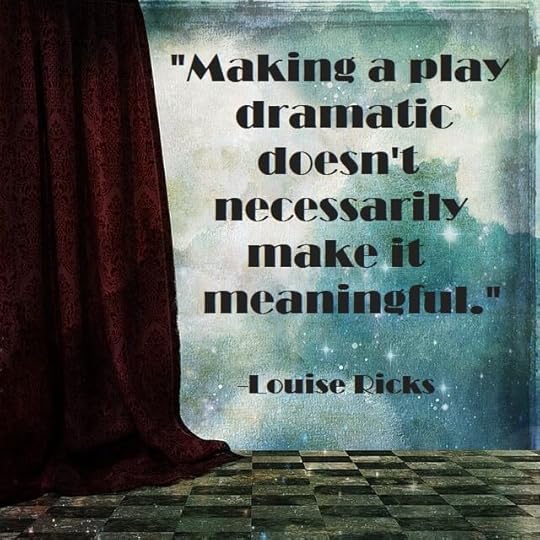 Louise: Making a play dramatic doesn’t necessarily make it meaningful. I’ve come across so many first drafts that define characters by giving them addictions or suicidal thoughts. Audiences don’t want to have a character yell at them about their problems. They want to see the journey. How did that character get to that place? What are they doing to fight (or not fight) against it? How does that affect their actions? Answer those questions for yourself first before you write an emotional monologue explaining it. Nine times out of ten, you’ll discover the humanity in your character and scrap the monologue.
Louise: Making a play dramatic doesn’t necessarily make it meaningful. I’ve come across so many first drafts that define characters by giving them addictions or suicidal thoughts. Audiences don’t want to have a character yell at them about their problems. They want to see the journey. How did that character get to that place? What are they doing to fight (or not fight) against it? How does that affect their actions? Answer those questions for yourself first before you write an emotional monologue explaining it. Nine times out of ten, you’ll discover the humanity in your character and scrap the monologue.
Kris: Okay, one last question for you, and it’s a big one. How do you know when you are done?
Louise: I’m done when my characters have nothing else to say. There is an end to every conversation. Listen to the natural flow of your story, and accept when the moment, however enjoyable it might have been at the time, is over.
What a wonderful answer to this final question. Sometimes, it can be so difficult to call a project finished, but perhaps to a wordsmith who spends time on the stage, everything has its moment for the curtain to come down. Maybe there’s something we can all learn from that.
Thank you so much for sharing your thoughts on your craft, Louise Ricks, and happy writing, folks!
Join 550+ subscribers and sign-up for my monthly email newsletter for more interviews like this.
The post Authors on Editing: Interview with Louise Ricks appeared first on Kris Spisak.
August 6, 2017
Trivia: Mediocre


Join 550+ subscribers and sign-up for my monthly email newsletter for more language trivia like this.
The post Trivia: Mediocre appeared first on Kris Spisak.
August 3, 2017
Writing Tip 229: “More Proud” vs. “Prouder” (And when to use “-er” and “-est” vs. “more” and “most”)


Is it possible to be more proud than a peacock?
If your mom has ever told you she couldn’t be more proud, maybe she said it because it was true. But before you start feeling all the warm fuzzies, maybe it was just a matter of linguistics. “More proud” isn’t really a thing. She couldn’t be “more proud,” because that combination of words isn’t technically correct.
I feel like I might have just broken some hearts. Don’t worry. I’m sure your mom couldn’t be prouder of you. (That’s the correct form of the sentiment.)
When it comes to superlatives, sometimes it’s tricky when deciding which words get “–er” or “-est” endings and which words get “more” or “most” placed in front of them. As with most things in the English language, there’s an easy rule for knowing the difference; unsurprisingly, there’s also a lot of exceptions to the easy rule—but we’ll worry about that later.
Superlative rule #1 – If the adjective you’re using has one syllable, use the “-er” and “-est” suffixes (e.g., “proud,” “prouder,” “proudest”; “high,” “higher,” “highest”; or “thick,” “thicker,” “thickest”).
Superlative rule #2 – If the adjective you’re using has three or more syllables, always use “more” or “most” in front of the word (e.g., “terrified,” “more terrified,” “most terrified”; “intelligent,” “more intelligent,” “most intelligent”; “confusing,” “more confusing,” “most confusing”).
You’ll notice a major gap in these rules, and I bet you can already think of a few exceptions. “But what about the two syllable words?” I hear you saying. And what about “good,” “better,” “best”?
I know, I know… the English language is one of rebellion, and there are always exceptions to rules. However, knowing the rule in the first place gives you a good start. (If it helps, for those two-syllable adjectives, there is a secondary rule concerning the final letters of the word, which is mostly followed, but we’ll get into that another day.)
To get back to the original debate, “proud” is one syllable. Thus, “prouder” is the correct form. This single-syllable adjective often seems to have more confusion than others, but technically, “prouder” is correct.
You don’t have to correct your mom, but if you’re saying it to your own kids—or dogs or peacocks—make sure you get it right.
Join 550+ subscribers and sign-up for my writing and editing email newsletter for more tips like this.
The post Writing Tip 229: “More Proud” vs. “Prouder” (And when to use “-er” and “-est” vs. “more” and “most”) appeared first on Kris Spisak.
August 1, 2017
Trivia: “Foggy Toddlers”

Join 550+ subscribers and sign-up for my monthly email newsletter for more language trivia like this.
The post Trivia: “Foggy Toddlers” appeared first on Kris Spisak.
July 27, 2017
Writing Tip 228: “School of Fish” vs. “Shoal of Fish”


Hmm… are these fish “schooling” or “shoaling”?
It’s time to get schooled on a “school of fish” vs. “shoal of fish.” Here’s your hint: one of them shoals, and one of them “schools.” Did that help? What do you mean “No”?
This is a tip designed to make you look savvy, since most people aren’t aware of a difference.
You can think about a “school of fish” vs. “shoal of fish” in terms of fish independence. Just because a fish is swimming in a group, doesn’t mean that it’s following the crowd.
Some fish shoal and some fish school. Here’s the difference:
A shoal of fish swims together, but they are not swimming in unison or in any coordinated formation. In addition, any fish in the group may stop or break off at any time. If, when swimming with the group, one fish decides to turn in the opposite direction to chat with one of its fishy friends, it’s still shoaling. If it looks down, up, left, right, or at the beautiful coral behind it, it’s still shoaling. Shoaling fish include tetras and most fresh water aquarium small egg-laying fish, among many others.
A school of fish swims together as one fluid formation, with the movements of each fish an essential part of the whole. Fish that school have a team mentality. There’s no “I” in team, and there’s no independent behavior in a school of fish. Tuna are fish that school, as are herring, anchovy, and sometimes Atlantic cod.
Schooling fish go with the crowd. Uniformity of movement and position is essential. Shoaling fish sometimes go with the crowd, and sometimes do their own thing while hanging out in close proximity.
Schooling fish evade their predators by creating the formation and behavior of a larger creature. A shoal is a similar group of fish, but there’s less strategy in play. It’s working with safety in numbers but without the intricate, synchronized dance.
Just like “poisonous” vs. “venomous” snakes, when it comes to nature, it’s good to know the difference. It’s not just vocabulary. It’s the joy of discovering the world around us, don’t you think?
Join 550+ subscribers and sign-up for my writing and editing email newsletter for more tips like this.
The post Writing Tip 228: “School of Fish” vs. “Shoal of Fish” appeared first on Kris Spisak.
July 25, 2017
Trivia: Numbers That Begin With “B”
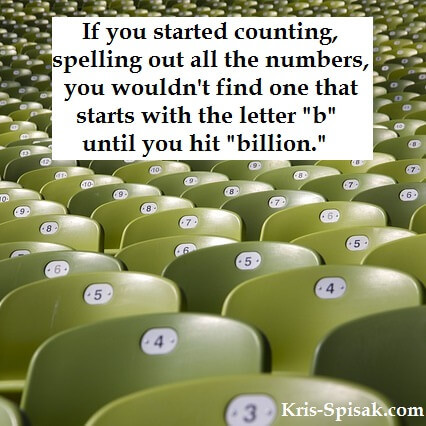
Join 550+ subscribers and sign-up for my monthly email newsletter for more language trivia like this.
The post Trivia: Numbers That Begin With “B” appeared first on Kris Spisak.



